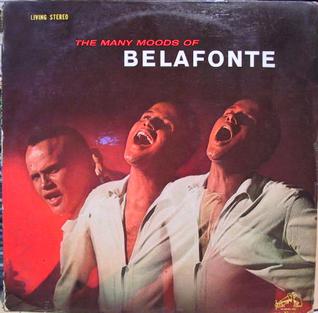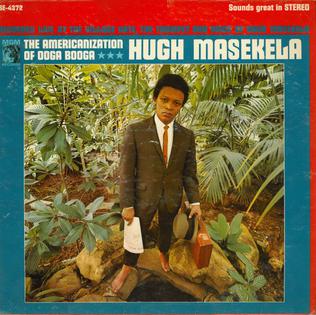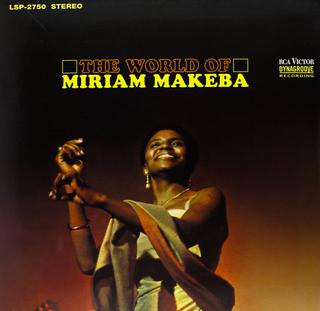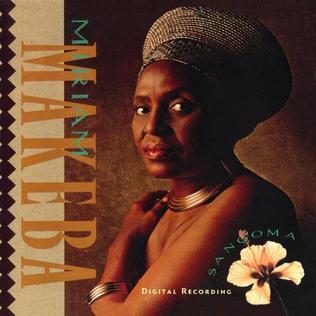
Hugh Ramapolo Masekela was a South African trumpeter, flugelhornist, cornetist, singer and composer who was described as "the father of South African jazz". Masekela was known for his jazz compositions and for writing well-known anti-apartheid songs such as "Soweto Blues" and "Bring Him Back Home". He also had a number-one US pop hit in 1968 with his version of "Grazing in the Grass".

Zenzile Miriam Makeba, nicknamed Mama Africa, was a South African singer, songwriter, actress, and civil rights activist. Associated with musical genres including Afropop, jazz, and world music, she was an advocate against apartheid and white-minority government in South Africa.

"Grazing in the Grass" is an instrumental composed by Philemon Hou and first recorded by the South African trumpeter Hugh Masekela. Released in the United States as a single in 1968, it followed United States trumpeter Herb Alpert's vocal performance of "This Guy's in Love with You" to the top spot on the Hot 100 chart, ranking it as the 18th biggest hit of the year. The song also reached No. 15 Adult Contemporary. Masekela included the song in his albums Grazing in the Grass: The Best of Hugh Masekela (2001), Still Grazing (2004), and Live at the Market Theatre (2006).

The Many Moods of Belafonte is an album by Harry Belafonte, released by RCA Victor (LSP-2574) in 1962. The album features performances by South African trumpeter Hugh Masekela and vocalist Miriam Makeba.

Welela is an album by the South African musician Miriam Makeba, released in 1989. It was produced primarily by Sipho Mabuse.
"Soweto Blues" is a protest song written by Hugh Masekela and performed by Miriam Makeba. The song is about the Soweto uprising that occurred in 1976, following the decision by the apartheid government of South Africa to make Afrikaans a medium of instruction at school. The uprising was forcefully put down by the police, leading to the death of between 176 and 700 people. The song was released in 1977 as part of Masekela's album You Told Your Mama Not to Worry. The song became a staple at Makeba's live concerts, and is considered a notable example of music in the movement against apartheid.

The Americanization of Ooga Booga is a live album by South African jazz trumpeter Hugh Masekela. MGM released the record in June 1966.

Africa '68 is a studio album by South African jazz musician Hugh Masekela released in 1968 via Uni Records label. It was probably recorded in New York circa 1966 and Los Angeles circa late 1967.

Reconstruction is the twelfth studio album by South African jazz trumpeter Hugh Masekela released via Chisa Records label in July 1970. The album was re-released on CD in 1994 via MoJazz label.

You Told Your Mama Not to Worry is the twentieth studio album by South African musician Hugh Masekela. It was recorded in Kumasi, Ghana, and released on 9 November 1977 via Casablanca Records label.

Still Grazing: The Musical Journey of Hugh Masekela is an autobiography book by South African trumpeter Hugh Masekela. It was released on May 11, 2004 by Crown Archetype. The book was written together with D. Michael Cheers. In this book, Masekela tells a story of his forty-year career in the world of African jazz and his travels from South Africa to New York, then to Jamaica, and then back to his homeland. The book is complemented by the album of the same name.
This is a discography of South African musician Miriam Makeba (1953-2008).

Sixty is a 2000 studio album by South African jazz trumpeter Hugh Masekela. It was recorded in Johannesburg, South Africa, and released via the Shanachie label.

The Many Voices of Miriam Makeba is a 1962 studio album of Miriam Makeba.

The World of Miriam Makeba is the third studio album by Miriam Makeba released by RCA Victor. It charted at #86 on the US album chart. Hugh Masekela was credited as the conductor.

The Voice of Africa is the 1964 fourth album of Miriam Makeba issued by RCA Victor. It charted at #122 on the US album chart.

Makeba Sings! is the fifth album by Miriam Makeba, released by RCA Victor in 1965. The album charted at number 74 in the US album chart.

Reflections is the 2004 final studio album of Miriam Makeba. It won three prizes at the South African Music Awards in 2004.

Sangoma is an album by the South African musician Miriam Makeba, released in 1988. It was a comeback album after a long pause since Comme une symphonie d'amour, in 1979, spurred by touring with Paul Simon, who was promoting his album Graceland. The album's chants were taught to Makeba by her mother. While recording this album she was in a wheelchair due to fracturing her leg while on the Graceland tour.

No Borders is the forty-fourth and final studio album by South African jazz trumpeter Hugh Masekela. The album was released on 11 November 2016 via Universal Music label.


















